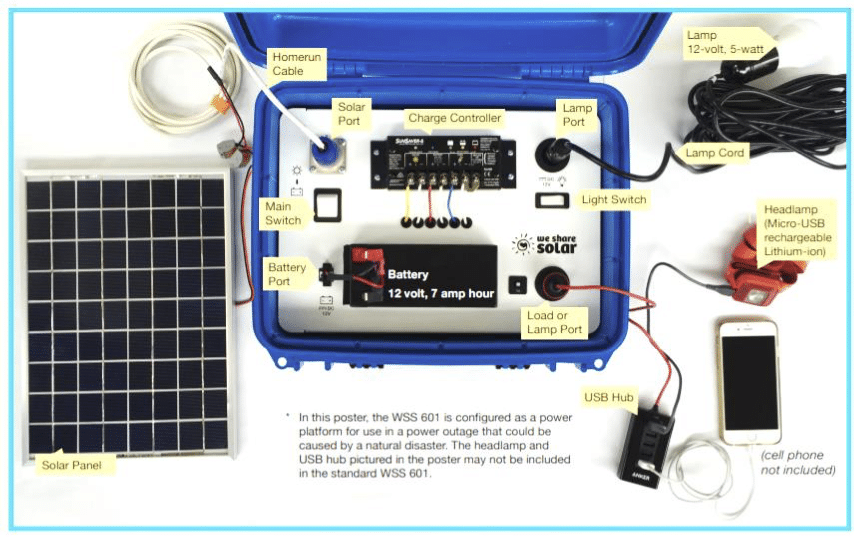Imagine if researchers could take a portable power plant into the most far-flung recesses of the world—the bottom of canyons, the middle of rainforests, tiny oases in the desert where electricity doesn’t reach.
Through a partnership with We Care Solar, Northern Arizona University is putting that technology to use. Information Technology Services (ITS) is collaborating to bring the company’s innovative Solar Suitcases to NAU. The suitcases are compact, portable solar electricity systems that the university will use to further learning and benefit the school in many ways, including field research, emergency management and supporting Native American students in communities that don’t have electricity. Students at NAU will not only get to use the suitcases but also will learn to build them during a two-day workshop on campus Nov. 2-3.
“This project has so many positive aspects to it: the opportunity for student service in building and maintaining the units; curriculum enrichment; getting students involved from an academic standpoint to learn how solar works and having units to experiment with; the ability to deploy units in field research in deserts, forests and canyons where power does not reach; and of course to provide units to students who may not have electricity in their home so they can learn online or in place,” Chief Information Officer Steve Burrell said.
The We Share Solar Suitcase for Education is a stand-alone 12-volt DC solar power system— one that’s small and light enough to be carried around but durable enough to be taken to rural or rugged areas. The power system is designed to fit inside its hallmark blue suitcase-shell.
Typically, the suitcases get shipped abroad to schools and orphanages requesting reliable lighting and power sources for everyday educational use, but Burrell saw the same need closer to home—specifically, NAU’s Personalized Learning students. Personalized Learning allows students to earn degrees entirely online in an effort to help nontraditional students achieve their educational goals—but they need access to the Internet, which requires reliable power.
It was the story of one student, in particular, that caught Burrell’s attention.
Terence Burley was featured in a 2017 PBS story detailing his experience living on the Navajo reservation in northern Arizona and pursuing a degree online—without any electricity in his home. At the time of the story, he used his cellphone to connect to the internet and kept his laptop battery charged by plugging it into his truck. With the We Share Solar Suitcase, students like Burley won’t have to struggle to find energy sources that are essential for completing an online degree.
“While we often think of these sorts of programs enabling Third World citizens, there are students in northern Arizona that can benefit greatly from this simple technology—benefits that can change their lives—and who in turn become shining stars of change for their communities,” Burrell said.
A system so powerful has reach far beyond the Personalized Learning program. Students doing fieldwork on wildlife in Zambia, climate change in Alaska and even those studying ecology in remote areas near NAU can use these suitcases in their research. Burrell sees students experimenting with the real-world needs and applications the suitcases can be used for and, ultimately, creating specialized units in the future that are custom-built for learning, research or disaster recovery scenarios.
For the pilot program workshops in November, Burrell is seeking eight student participants representing different areas at NAU. The suitcase kits include components such as LED lights, a headlamp, USB phone charger and USB hub. NAU’s suitcases also will contain a lithium battery, a laptop charging cord and a flex solar panel donated by SunPower—all the necessities for the kind of hands-on learning done far outside the walls of a normal classroom.
Burrell anticipates this pilot program will be the beginning of a broader program that sets NAU up as a teaching center for other rural western states that want to learn how to build the suitcases and integrate the program into their K-12 curriculums and communities. To him, the We Share Solar Suitcase program has great undiscovered potential and trusts NAU students and researchers are up to the task of finding it and sharing it with others.
“The key thing is the involvement of students in the greater context of facilitating and positively impacting learning, discovery, service that drives the prosperity of citizens in our Arizona communities,” he said.



